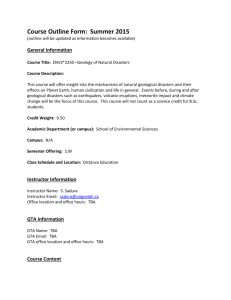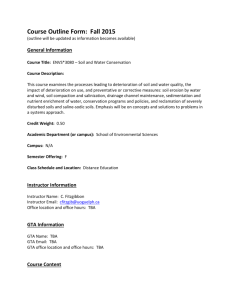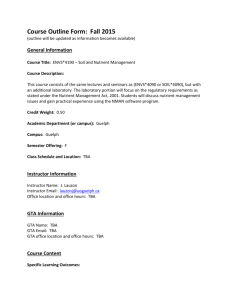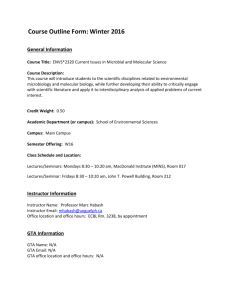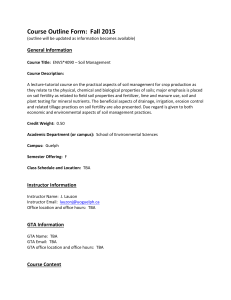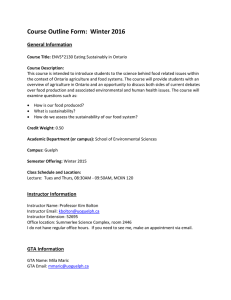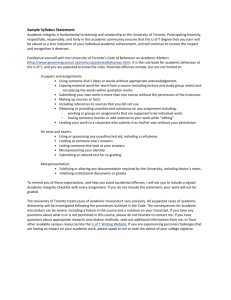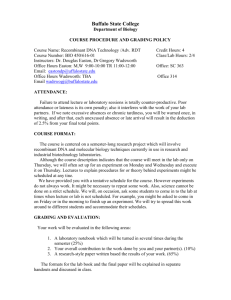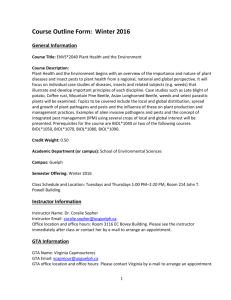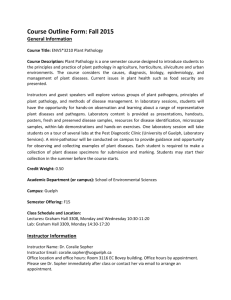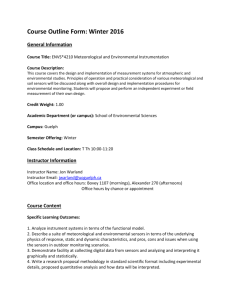ENVS*4110 Physical Meteorology
advertisement
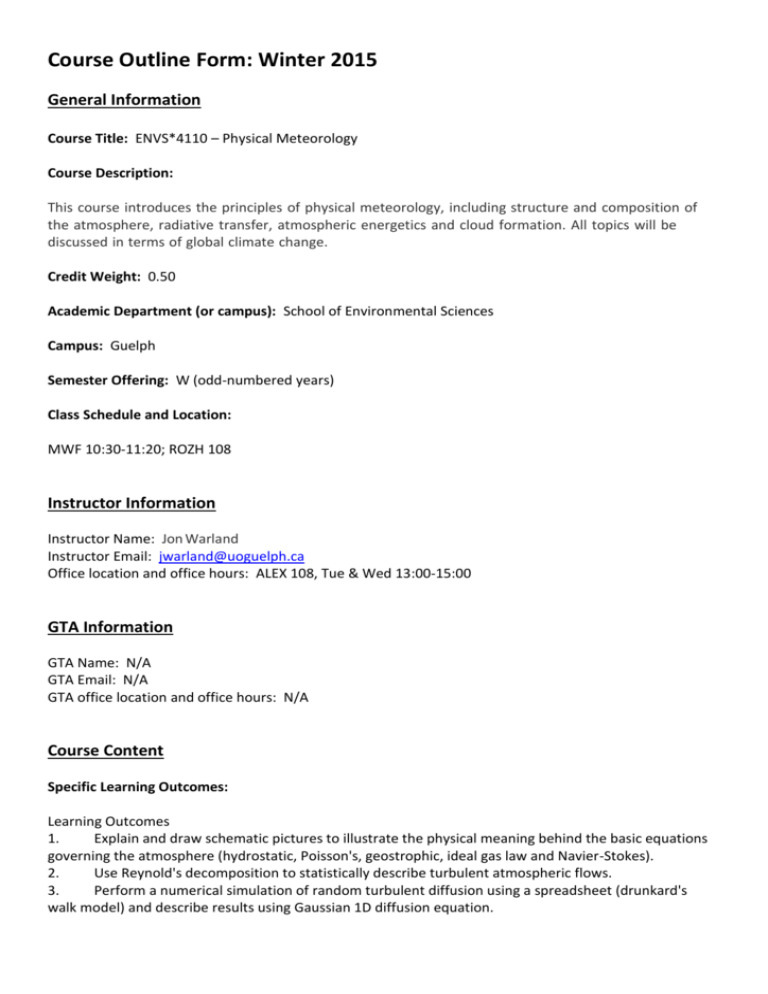
Course Outline Form: Winter 2015 General Information Course Title: ENVS*4110 – Physical Meteorology Course Description: This course introduces the principles of physical meteorology, including structure and composition of the atmosphere, radiative transfer, atmospheric energetics and cloud formation. All topics will be discussed in terms of global climate change. Credit Weight: 0.50 Academic Department (or campus): School of Environmental Sciences Campus: Guelph Semester Offering: W (odd-numbered years) Class Schedule and Location: MWF 10:30-11:20; ROZH 108 Instructor Information Instructor Name: Jon Warland Instructor Email: jwarland@uoguelph.ca Office location and office hours: ALEX 108, Tue & Wed 13:00-15:00 GTA Information GTA Name: N/A GTA Email: N/A GTA office location and office hours: N/A Course Content Specific Learning Outcomes: Learning Outcomes 1. Explain and draw schematic pictures to illustrate the physical meaning behind the basic equations governing the atmosphere (hydrostatic, Poisson's, geostrophic, ideal gas law and Navier-Stokes). 2. Use Reynold's decomposition to statistically describe turbulent atmospheric flows. 3. Perform a numerical simulation of random turbulent diffusion using a spreadsheet (drunkard's walk model) and describe results using Gaussian 1D diffusion equation. 4. Interpret standard Environment Canada surface and upper air maps and use to make basic forecasts. 5. Define, describe and use in forecasting the concepts of: geopotential height, thickness, CAPE and vorticity. 6. Interpret a standard 4-panel model output map. 7. Use the full suite of maps available from Environment Canada to perform a 48 hour forecast. Lecture Content: Tentative Schedule of lecture topics Week Topics Assessment 1 Assignment 1 Mass of the atmosphere, hydrostatic equation, Poisson's equation 2 Forces acting on the atmosphere, Ideal Gas Law Assignment 2 3 Balance of Forces and Navier-Stokes, Geostrophic wind Assignment 3 4 Review, catch-up Mid term 1 5 Reynold's decomposition and turbulent statistics 6 Random walk modeling Assignment 4 7 Review of surface maps and basic forecasting Assignment 5 8 Upper air maps and their use in forecasting Assignment 6 9 Map variables in detail: geopotential, geopotential height, thickness, etc. 10 Skew-T diagrams and CAPE 11 4-panel model output maps, vorticity 12 Forecasting contest Mid term 2 Forecast Labs: N/A Seminars: N/A Course Assignments and Tests: Assignment or Test Due Date Jan. 14 Contribution to Final Mark (%) 6% Learning Outcomes Assessed 1 Mass of atmosphere assignment Forces and Ideal Gas Law Geostrophic and Ekman spiral Midterm 1 Random walk model Forecast from surface map Forecast from 500 mb map Midterm 2 Forecast contest (mark not based on accuracy) Jan. 21 6% 1 Jan. 28 6% 1 Jan. 30 Feb. 23 Mar. 4 15% 6% 6% 1 2,3 4 Mar. 11 6% 4 Mar. 20 Apr. 1 15% 14% 2,3,4,5 4,5,6,7 Assignment or Test Due Date Take-home final Apr. 13 Contribution to Final Mark (%) 20% Learning Outcomes Assessed 1,2,3,4,5,6,7 Final examination date and time: See above Final exam weighting: See above Course Resources Required Texts: N/A Recommended Texts: N/A Lab Manual: N/A Other Resources: Course material will be provided through CourseLink. Students may also request printed copies of the class notes. Field Trips: N/A Additional Costs: N/A Course Policies Grading Policies All assignments are due in class on the date specified. Late assignments will not be accepted except where alternative arrangements have been made at least 48 hours prior to the due date. Course Policy on Group Work: Students may complete the assignments individually or in pairs. Course Policy regarding use of electronic devices and recording of lectures: Electronic recording of classes is expressly forbidden without consent of the instructor. When recordings are permitted they are solely for the use of the authorized student and may not be reproduced, or transmitted to others, without the express written consent of the instructor. University Policies Academic Consideration: When you find yourself unable to meet an in-course requirement because of illness or compassionate reasons, please advise the course instructor in writing, with your name, id#, and e-mail contact. See the academic calendar for information on regulations and procedures for Academic Consideration: Academic Consideration, Appeals and Petitions Academic Misconduct: The University of Guelph is committed to upholding the highest standards of academic integrity and it is the responsibility of all members of the University community, faculty, staff, and students to be aware of what constitutes academic misconduct and to do as much as possible to prevent academic offences from occurring. University of Guelph students have the responsibility of abiding by the University's policy on academic misconduct regardless of their location of study; faculty, staff and students have the responsibility of supporting an environment that discourages misconduct. Students need to remain aware that instructors have access to and the right to use electronic and other means of detection. Please note: Whether or not a student intended to commit academic misconduct is not relevant for a finding of guilt. Hurried or careless submission of assignments does not excuse students from responsibility for verifying the academic integrity of their work before submitting it. Students who are in any doubt as to whether an action on their part could be construed as an academic offence should consult with a faculty member or faculty advisor. The Academic Misconduct Policy is detailed in the Undergraduate Calendar: Academic Misconduct Policy Accessibility: The University of Guelph is committed to creating a barrier-free environment. Providing services for students is a shared responsibility among students, faculty and administrators. This relationship is based on respect of individual rights, the dignity of the individual and the University community's shared commitment to an open and supportive learning environment. Students requiring service or accommodation, whether due to an identified, ongoing disability or a short-term disability should contact the Centre for Students with Disabilities as soon as possible. For more information, contact CSD at 519-824-4120 ext. 56208 or email csd@uoguelph.ca or see the website: Student Accessibility Services Website Course Evaluation Information: The School of Environmental Sciences takes student feedback seriously. The SES Director sees all student feedback and discusses this feedback with the faculty where appropriate. Numerical scores and signed student comments are reviewed by the School’s Tenure & Promotion Committee, and are considered in our evaluation of the faculty member for the granting of tenure, advancement in rank, and performance related salary increases. This committee will NOT see comments that are not signed by the student. Faculty members are not able to access their own teaching evaluations until after their final grades are submitted to the registrar. Please refer to the Course and Instructor Evaluation Website Drop date: The last date to drop one-semester courses, without academic penalty, is March 6, 2015. For regulations and procedures for Dropping Courses, see the Academic Calendar: Current Undergraduate Calendar Additional Course Information
